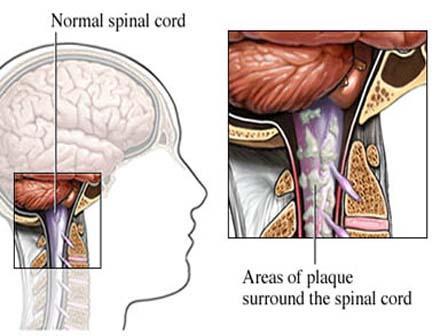
A diagnosis of multiple sclerosis or M.S. is one, which many people dread because we associate it with slow and progressive deterioration into disability. In fact, only a minority of those with M.S. will suffer its most crippling effects and there is much you can do to stay healthy and lead a normal life in spit of this disease.
M.S. occurs as a result of damage to the nerve fibres of the central nervous system (the brain and spinal cord). This happens when the sheath of fatty tissue or myelin, which insulates the nerves, is attacked and becomes inflamed. Different people will have different symptoms, depending on which nerves have been damaged. The most common age of diagnosis is late 20’s to mid 30’s.
M.S. symptoms are caused by patches of “demyelination” (scarring) in the central nervous system and, depending on which nerves are scarred, movement, touch and sensation may be affected. M.S. is a very variable condition, but early symptoms often include tingling sensations or numbness which may affect a hand or foot – sometimes described as “walking on cotton wool”.
Other common symptoms are blurred or double vision, weakness or clumsiness of a limb, giddiness or lack of balance, disproportionate fatigue and the need to pass water frequently or urgently. Sometimes these symptoms simply disappear, never to be experienced again, but they may recur and worsen in a series of “attacks” that may end in serious disability.
Researchers have been looking for the causes of M.S. for years, so far without success. It could be that a virus causes the inflammation of the myelin sheath, or inherited factors could be to blame. Complementary practitioners have linked M.S. to weakness of the nervous system which may be caused by stress, shock, infection or toxic metals. Another theory is that M.S. Is linked to the effects of radiation from the sun.
AYURVEDA
While he stresses that the symptoms of M.S. vary from person to person, and that it is easier to treat someone in the earlier stages of this disorder than someone who is already in a wheelchair, one practitioner maintains that Ayurveda is highly effective in treating neurological weakness. “Ayurvedic oral and external preparations are made to stimulate motor nerve functions.
Panchakarma (revitalizing) therapy is most useful. Some other detoxification treatment cold last from six months to two years or longer, involving at least one consultation a month.
The practitioner tells of how he treated a nurse colleague who was suffering numbness in her lower limbs and mild symptoms of weakness. “After one year during which I treated her with Ayurveda and acupuncture, all of her symptoms and weakness disappeared. She is still working in our practice. She has needed no treatment during the past two years and is completely free of symptoms of this disease.
